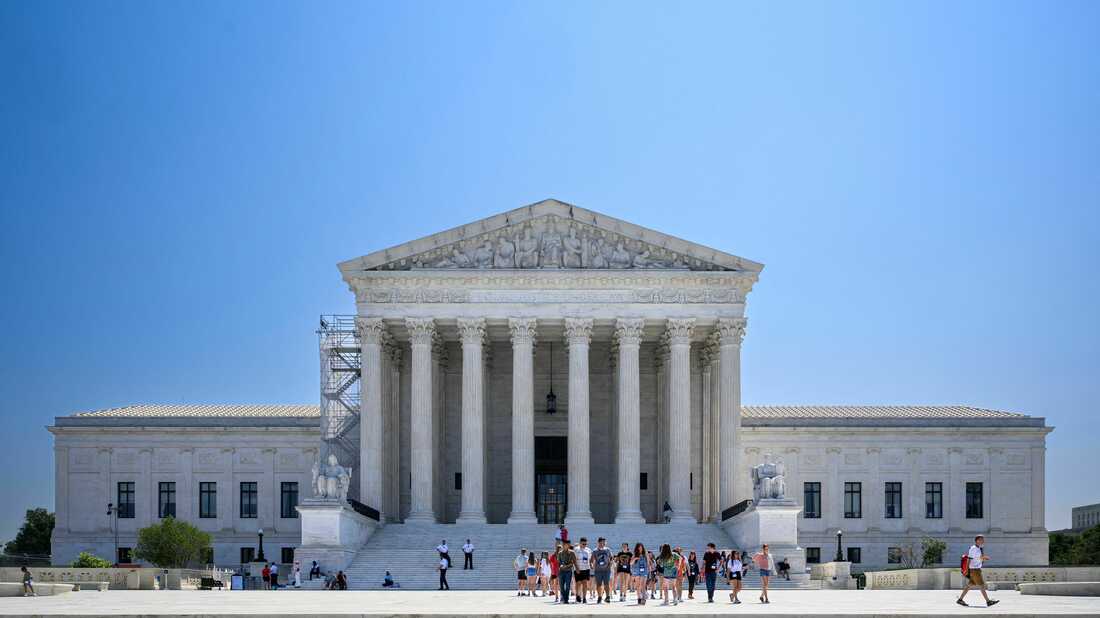Here are the major Supreme Court decisions we’re still waiting for this term
Law
Here are the major Supreme Court decisions we’re still waiting for this term

The U.S. Supreme Court has about four weeks left to release opinions for more than two dozen cases it heard this term.
Mandel Ngan/AFP via Getty Images
hide caption
toggle caption
Mandel Ngan/AFP via Getty Images
The U.S. Supreme Court has about four weeks left to release opinions for more than two dozen cases it heard this term.
Mandel Ngan/AFP via Getty Images
The U.S. Supreme Court has yet to issue opinions in 27 cases that it heard this term, and has about four weeks left to release them.
Opinions usually are scheduled for Thursday, but with time running out, the court will likely add days in which it will release its decisions.
Here are the major cases NPR is watching:
Affirmative Action
Students for Fair Admission v. Harvard and Students for Fair Admission v. University of North Carolina
At issue are affirmative action programs at the the University of North Carolina, which until the 1950s did not admit Black students, and Harvard University, which was the model for the Supreme Court’s 1978 decision declaring that colleges and universities may consider race as one of many factors, from the applicant’s geographical and family background, to their special talents in science, math, athletics, and even whether the applicant is the child of the school’s alumni.
The two cases overlap. Because UNC is a state school, the question is whether its affirmative-action program violates the 14th Amendment’s guarantee to equal protection of the law. And even though Harvard is a private institution, it still is covered by federal anti-discrimination laws because it accepts federal money for a wide variety of programs. The cases were argued last October.
Read more about the cases:
Voting Rights Act
Merrill v. Milligan
At issue in Alabama’s congressional redistricting plan adopted by the Republican state legislature after the 2020 census. More than a quarter of the state’s population is African American, but in only 1 of 7 districts do minority voters have a realistic chance of electing the candidate of their choice. Black voters are either concentrated in that district so they are a supermajority there or spread out across the remaining six districts so that their voting power is diluted. It’s a practice known as packing and cracking.
In January 2022, a three-judge federal court panel ruled unanimously that Alabama could and should have created two compact congressional districts with a majority, or close to a majority, of Black voters: two districts instead of just one. Two of the judges on the panel were Trump appointees, the third a Clinton appointee.
The state appealed to the Supreme Court, which by a 5-4 vote blocked the lower court ruling, which ordered a new map for the 2022 election, then nine months away. That was too much for Chief Justice John Roberts, a longtime critic of the Voting Rights Act, but who this time dissented along with the court’s three liberals. He said he could find “no apparent errors” in the way the lower court applied existing precedents. What he didn’t say was whether the court should revisit some of those precedents. The case was argued in October.
Read more about the case:
Indian Child Welfare Act
Haaland v. Brackeen
The case pitted several prospective adoptive parents and the state of Texas against the Indian Child Welfare Act — a federal law aimed at preventing Native American children from being separated from their extended families and their tribes.
Texas and several families who are adopting American Indian children challenged the law in court. They contended it amounts to an unconstitutional racial preference, and that the federal law impermissibly intrudes on state autonomy. The case was argued in November.
Read more about the case:
LGBTQ rights
303 Creative v. Elenis
The case pits two constitutional principles against each other. On one side are laws that guarantee same-sex couples equal access to all businesses that offer their services to the public. On the other are business owners who see themselves as artists and don’t want to use their talents to express a message that they don’t believe in.
The plaintiff in the case is a Colorado web designer who argues that Colorado’s public accommodations law prevents her from doing what she wants to do most — custom web designs for weddings. The reason: She believes that marriage should only be between a man and a woman. The case was argued Dec. 6.
Read more about the case:
Independent state legislature theory
Moore v. Harper
At issue is the so-called independent state legislature theory, put forth in this case by the North Carolina Republican State Legislature. If adopted, it would give state legislatures the power to put in place all manner of election laws and rules without any review by the state courts. At its most extreme, the theory could eliminate not just state judicial power over elections, but governor’s vetoes. And it might allow state legislatures to certify presidential electors who were not approved by the voters – an idea that Donald Trump tried unsuccessfully to put forth in 2020.
In the particular case before the justices, the North Carolina Supreme Court ruled that the Republican-dominated state Legislature, in drawing new congressional districts after the 2020 census, violated the state constitution with an extreme partisan gerrymander.
The case was argued Dec. 7.
Read more about the case:
Sunday work at USPS
Groff v. DeJoy
Case tests how far employers must go to accommodate the religious views of employees.
Forty-six years ago, the court, by a lopsided margin, ruled that an employer need not accommodate a worker’s desire to avoid work on the Sabbath if that would mean operating shorthanded or regularly paying premium wages to replacement workers. The court went on to say that employers should not have to bear more than what it called, quote, “a de minimis,” or trifling, cost.
The de minimis language has sparked lots of criticism over the years, but Congress has repeatedly rejected proposals to provide greater accommodation for religious observers, including those who object to working on the Sabbath. Now, however, religious groups of every kind are pressing a new and more conservative group of justices to overturn or modify the court’s earlier ruling. The case was heard in April.
Read more about the case:
Student loans
Biden v. Nebraska
A handful of Republican-dominated states – Missouri, Nebraska, Iowa, Arkansas, Kansas and South Carolina – have asked the Supreme Court to permanently block the Biden administration’s student loan forgiveness program. The states contend that the president exceeded his legal authority when he implemented a program to cancel up to $20,000 in debt for people holding federal student loans.
The merits of the case are fairly straightforward. Does the 2003 law, known as the HEROES Act, give the president and his secretary of education the power to authorize federal student loan forgiveness? The case was argued in February.
Read more about the case:
True threats
Counterman v. Colorado
The Supreme Court this termintended to frighten his target, or is it enough to show that his words would have that effect on a reasonable person?
The case involves Coles Whalen, a singer-songwriter from Colorado, and Billy Counterman, a man convicted and sentenced to four-and-a-half years in prison for “stalking” Whalen and making “true threats” against her. The case was heard in April.
Read more about the case:






